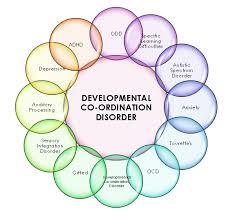Developmental Coordination Disorder (DCD/Dyspraxia)

What is DCD?
Developmental Coordination Disorder (DCD) is a motor skills disorder that affects five to six percent of all school-aged children. The ratio of boys to girls varies from 2:1 to 5:1, depending on the group studied. DCD occurs when a delay in the development of motor skills, or difficulty coordinating movements, results in a child being unable to perform common, everyday tasks. By definition, children with DCD do not have an identifiable medical or neurological condition that explains their coordination problems.
Frequently described as "clumsy" or "awkward" by their parents and teachers, children with DCD have difficulty mastering simple motor activities, such as tying shoes or going down stairs, and are unable to perform age-appropriate academic and self-care tasks. Some children may experience difficulties in a variety of areas while others may have problems only with specific activities. For a list of some of the more common characteristics that may be observed in a child with DCD, click here. Children with DCD usually have normal or above average intellectual abilities. However, their motor coordination difficulties may impact their academic progress, social integration and emotional development.
DCD is commonly associated with other developmental conditions, including attention deficit/hyperactivity disorder (ADHD), learning disabilities (LD), speech-language delays and emotional and behavioural problems. For more information on related developmental disorders and their co-occurrence with DCD, click here.
Do children with DCD "outgrow" their motor difficulties?
While it was once thought that children with DCD would simply outgrow their motor difficulties, research tells us that DCD persists throughout adolescence into adulthood. Children with DCD can and do learn to perform certain motor tasks well, however, they have difficulty when faced with new, age-appropriate ones and are at risk for secondary difficulties that result from their motor challenges. Although there is currently no cure for DCD, early intervention and treatment may help to reduce the emotional, physical and social consequences that are often associated with this disorder.
Diagnostic Criteria
The following criteria are necessary for a diagnosis of DCD to be given:
A) Learning and execution of coordinated motor skills is below expected level for age, given opportunity for skill learning.
B) Motor skill difficulties significantly interfere with activities of daily living and impact academic/school productivity, prevocational and vocational activities, leisure and play.
C) Onset is in the early developmental period.
D) Motor skill difficulties are not better explained by intellectual delay, visual impairment or other neurological conditions that affect movement.


